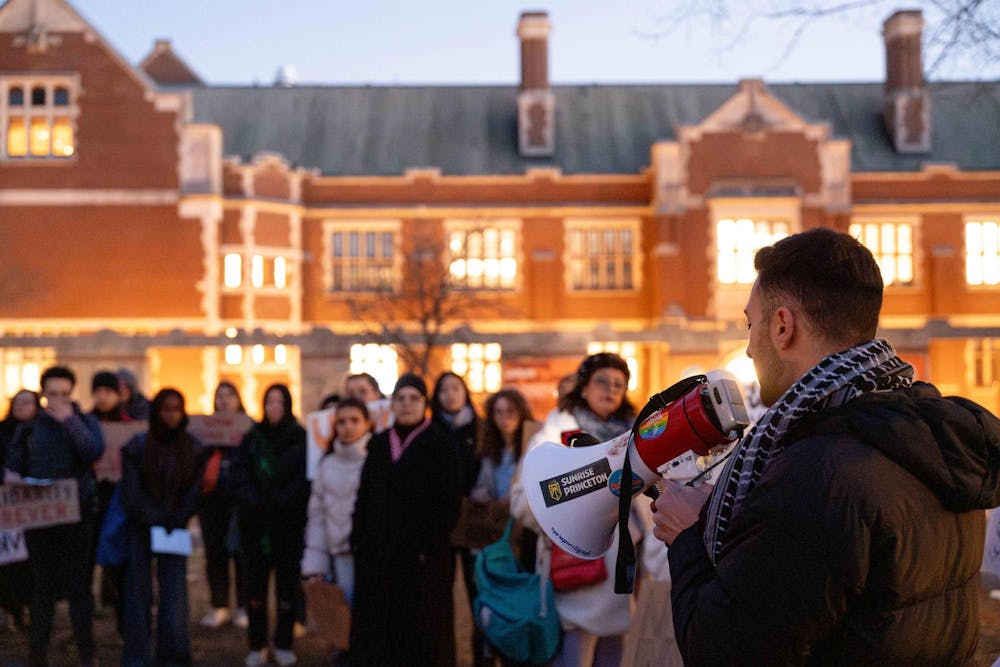A small crowd of undergraduates and community members gathered on Frist North Lawn on Monday to protest a lack of administrative action over three undergraduate referenda passed last fall — referenda that University President Christopher Eisgruber ’83 expressed are not the most effective change agents in a campus setting.
The rally started at 5:30 p.m., while the February Council of the Princeton University Committee (CPUC) meeting was still in session, although it did not go into full swing until 5:50 p.m., once several protestors who were asking questions at the CPUC meeting arrived at the front lawn. At its peak, there were more than 50 students and community members in attendance at the protest. It eventually moved to Nassau Hall.
The rally was organized by the Young Democratic Socialists of America (YDSA) and co-sponsored by Sunrise Princeton and Students for Justice in Palestine (SJP). All three organizations are part of the Princeton Progressive Coalition. Resistencia en Acción, a local immigrant rights organization, was also present.
“We’ll continue to show [the University] not just that we’re willing to go through their formal institutional process, but that we’re willing to put pressure on them day and night, that we’re not going to let them rest until we get actual action,” said Zach Goldberg ’28, an organizer for Sunrise and YDSA.
Last November, the undergraduate student body voted to pass all four referenda on the ballot. Three of them dealt with progressive issues, calling for improvements in employment standards for undergraduate workers, dissociation from fossil fuels, and divestment from companies involved in weapons manufacturing. The fourth referendum supported language classes to be taken pass/D/fail.
While these referendums passed with greater than two-thirds support — only 68 percent of votes were in favor of divestment from weapons manufacturing companies — the University has so far not changed its policies.
During the rally, protestors booed when an audio clip of Eisgruber speaking at the CPUC played, where he said that the referendums did not fall into Princeton’s governance process.
”I am not particularly a fan of referendum processes in general. I don’t think that they’re the best way to implement the ideals of any kind of republic or democracy,” Eisgruber said at the meeting, pointing to the CPUC‘s lengthy process for considering dissociation instead.
“We cannot pretend like the University is going to roll over,” Goldberg continued. “What we need are constant reminders that students won these demands, and we need continued demands that they are going to be seen through to the end.”
This protest is the first organized protest among a coalition of progressive organizations since the spring semester has started. A pro-Palestine protest to divest from Israeli companies was held several weeks ago on the first day of classes.
“We’re in solidarity with all of you guys,” a member of Resistencia en Acción told the students through his translator Richard Daniel. “Your fight is our fight, your struggle is our struggle.”
Multiple speakers at the rally criticized what they saw as a lack of transparency and student input throughout the referendum process.

“You students exercised the democratic rights and the democratic mandate last semester when you passed those referenda … we’re talking about thousands of people who turned out to vote in favor of three referenda,” Associate Professor of History Vera Candiani said, addressing the students at the protest. “[The administration’s actions are] fundamentally undemocratic, and it’s not just undemocratic, but actively anti-democratic, by refusing to even discuss, to even consider the limited options of the referendum that you all voted for.”
Referendums in recent years have had mixed success at Princeton. In 2022, undergraduates narrowly passed a referendum supporting a boycott of construction company Caterpillar Inc. due to its connections to alleged human rights violations against Palestinians. The University did not pursue dissociation.
Kristin Nagy ’27, who attended the rally as an organizer with SPEAR, told the ‘Prince’ that she believes a coalition of groups will make pushing for change more effective. Nagy is a former Prospect writer for the ‘Prince.’
“I think that when we all fight together, we’re stronger and we have much more power,” Nagy said. “So it makes me really happy that different organizing groups with different beliefs and different ideas were able to come together and have this community protest.”
One counter-protester, who played the Israeli national anthem off a phone, was present at Nassau Hall.
Starting this Thursday, weekly picketing related to referendums will happen in front of Nassau Hall, according to Goldberg.
Christopher Bao is a head News editor for the ‘Prince.’ He is from Princeton, N.J. and typically covers town politics and life.
Nikki Han is an assistant News editor for the ‘Prince.’
Luke Grippo and Cynthia Torres contributed reporting.
Please send any corrections to corrections[at]dailyprincetonian.com.
Correction: A previous version of this article said that the rally was organized by the Princeton Progressive Coalition. It was in fact organized by YDSA, and co-sponsored by Sunrise Princeton and SJP, all of whom are members of the Princeton Progressive Coalition.








